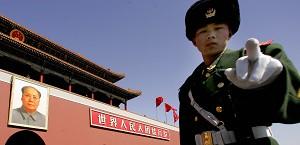EDINBURGH—China missed its chance to overturn the legacy of Communist leader Mao Zedong following his death 30 years ago and turn the country into a democratic and economic giant, his iconoclastic biographer Jung Chang said.
Chinese-born Chang, who wrote Mao, the Unknown Story with her English husband Jon Halliday, condemns Mao as a mass murderer and an egomaniac with a lust for power who caused incalculable damage to China.
But his legend as “the great helmsman” and towering statesman, if a sometimes misguided ruler, lives on, protected by a Communist leadership whose claim to legitimacy rests partly on his political legacy, she said.
“The party gained legitimacy from Mao. Mao has done so much damage to the Chinese people,” said Chang, accusing him of responsibility for the deaths of 70 million Chinese during peacetime alone.
In a biting condemnation at an Edinburgh Book Festival appearance late on Saturday, Chang said:
“It is totally unacceptable for Mao’s portrait to be on Tiananmen Square” where the giant picture peers down at passers-by from the entrance gate of the Forbidden City in central Beijing.
“It’s like the Germans having a portrait of Adolf Hitler on show in Berlin.”
According to Chang, Deng Xiaoping, who took power in the 1970s after Mao’s death aged 82 in 1976, missed his chance to fully debunk the Mao legend, as Nikita Khrushchev denounced late Soviet leader Josef Stalin for his oppressive policies in 1956.
Deng weighed Mao in the balance and found him 70 percent right and 30 percent wrong.
Powerhouse, but Restrictive
China is now a global economic powerhouse with expanding political stature. But both authors said it was still a restrictive society and it remained to be seen how it would develop.
Chang and Halliday believe their book can help set the Mao record straight, exposing what they see as oppressive policies which led to mass murder.
The biography, published in English this year by Jonathan Cape, is banned in China.
Chang said, however, that “pirated” Chinese translations have appeared in Taiwan and Hong Kong and bootleg copies are finding their way into China. They expect the book to be translated into more than 20 languages.
Chang, now a British citizen living and teaching in London, was born in Sichuan province in 1952 and came of age during the bitter turmoil of the Cultural Revolution.
In 1991, she published Wild Swans, the story of her family over three generations during the upheavals of 20th century China, which sold 10 million copies worldwide.
She came to Britain as a student in 1978 and became the first person from Communist China to receive a doctorate from a British university, in linguistics from York in 1982. Her husband is a noted historian and Russian expert.
The Mao biography is based on a decade of research, including many interviews in China itself with people who were quietly willing to discuss Mao and his policies, and from freshly available Russian documents.
Chang said a key moment in her research came when she sought the truth behind the great famine of 1958-61, in which she said 38 million people died. The famine had been blamed on misguided economic policies.
But, she said, Mao had ruthlessly exported foodstuffs in return for armaments and equipment with no interest in the plight of his own starving people.
“His single-handed goal was to build China into a military superpower, and for Mao to dominate the world,” she said.





